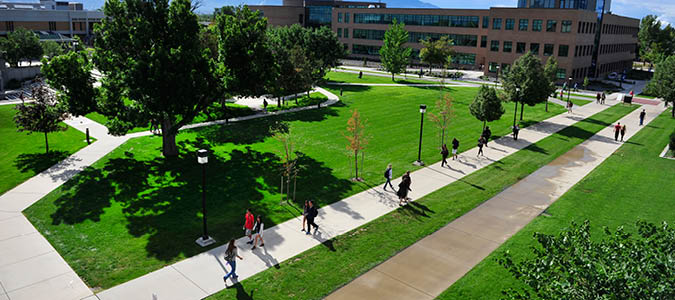Communities around the world are set to celebrate and advocate for Earth Day on April 22. Utah System of Higher Education institutions and their communities realize the importance of sustainable practices. Currently, no systemwide policy exists surrounding sustainability on USHE campuses, but each institution has implemented their own set of important measures.
Here’s a snapshot of how each USHE institution incorporates sustainability goals at their institutions.
University of Utah
As part of their Sustainability Action Plan, the U of U is working toward reaching carbon neutrality by 2050 by advancing environmental, economic and social guidelines for healthy and safe communities.
Committees on campus made of faculty, staff and students work toward drafting a new Sustainability Action Plan in the following areas:
- Administration and Communication
- Sustainability Education
- Sustainability Research
- Engagement (Student and Community)
- Air Quality, Emissions, Buildings, and Energy
- Food Systems (Dining, Gardens, and Wellness)
- Grounds and Water
- Purchasing
- Transportation (Commuting and Campus Mobility)
- Waste
- Diversity and Affordability
- Sustainable Investments
Examples of some of their efforts include:
- Water conservation in buildings— New buildings on campus are required to achieve 30% more indoor water efficiency than a baseline building.
- Air Quality Monitoring—The university collects emissions data for its greenhouse gas emissions inventory, which informs decisions and strategies for improving campus operations.
- Environmentally Preferable Purchasing Guidelines for staff—The university offers guidelines to faculty and staff in supporting and facilitating the purchase of products and materials that minimize the harmful effects to the environment from their production, transportation, use, and disposition.
Utah State University
USU is also committed to become carbon neutral by 2050. Currently, USU has a Sustainability Office, Council, and student groups and campus activities aimed at maintaining and implementing sustainable practices on campus.
Areas of focus on USU campus include:
- Air
- Curriculum
- Energy & Built Environment
- Engagement
- Greenhouse Gas Reduction Steering Committee
- Marketing
- Waste & Recycling
- Food
- Research
- Transportation
- Water
- Wellness
- Diversity
- Facilities
Utah Valley University
UVU works toward sustainability on their campus by focusing on the following areas:
- Local Ground Water—the university utilizes two irrigation ponds to water its grounds and reduce water waste.
- Solid Waste Reduction—UVU operates a recycling program to reduce waste around campus.
- Public Transportation—In an effort to lower the number of individual cars coming to campus, UVU provides discounted UTA passes for the bus and Frontrunner train to students, faculty and staff.
- University Events & Courses—Multiple courses are offered on sustainable practices. The university even has an Environmental Studies degree.
Weber State University
WSU also has a commitment to be carbon neutral by 2050. The university works toward their commitment to sustainability by enacting the following measures in both academics and operations:
- Offering Environmental Studies minor and other sustainability courses
- Creating an idle-free zone on campus to reduce greenhouse gas emissions
- Creating new buildings like the Dumke Center for health professions which uses about 40% less energy than another comparably sized, conventionally constructed building would.
- WSU works to make every part of food on campus sustainable from sourcing to composting and reduced food waste.
Southern Utah University
SUU has begun tracking their sustainability efforts in the Association for the Advancement of Sustainability Tracking, Assessment, and Rating System (STARS). As a result of that tracking, here are some things the university is doing well in sustainability, efficiency, and Conservation:
- Water—54 waterless urinals were installed on the campus saving 40,000 gallons of fresh water annually on each urinal.
- Waste—Recycling across campus is available.
- Grounds—Xeriscaping and drought tolerant plants are used to lower the use of irrigation water and the use of fossil fuels for mowing, etc.
- Air & Climate—SUU uses only ultra-low sulfur diesel fuel on campus to reduce sulfur dioxide emissions.
Dixie State University
DSU runs the Sustainability Club which is a student organization advocating for sustainable practices and climate change awareness at the university and throughout the community.
DSU has implemented a recycling program in many of their buildings and are working toward campuswide recycling.
Salt Lake Community College
SLCC has a Sustainability Committee and also works toward better practices in:
- Academics—The SLCC Energy Institute provides education and training in a variety of areas.
- Gardens—utilized to promote sustainable gardening practices
- Recycling—Recycling bins are located in every building for plastic, aluminum, and paper products.
- Solar—SLCC is increasingly reliant on solar technology to power some of its buildings including the Lifetime Activities Center.
- Transportation—SLCC’s motor pool has several hybrid and electric vehicles available for use by authorized staff and faculty.
Snow College
Sustainability on Snow’s campus is monitored in order to improve campus while reducing the environmental impact of the college operations and transportation. Key strategies are implemented that can reduce the environmental footprint of Snow College and reduce operation and construction costs including:
- Utilizing LED lighting across campus to reduce energy costs, use, and maintenance
- Implementing infrastructure improvements focused on energy reduction
- Designing and constructing new buildings to meet and exceed requirements set by the State of Utah High Performance Building Standard.
- Encouraging the use of bikes and walking to reduce the need for driving


